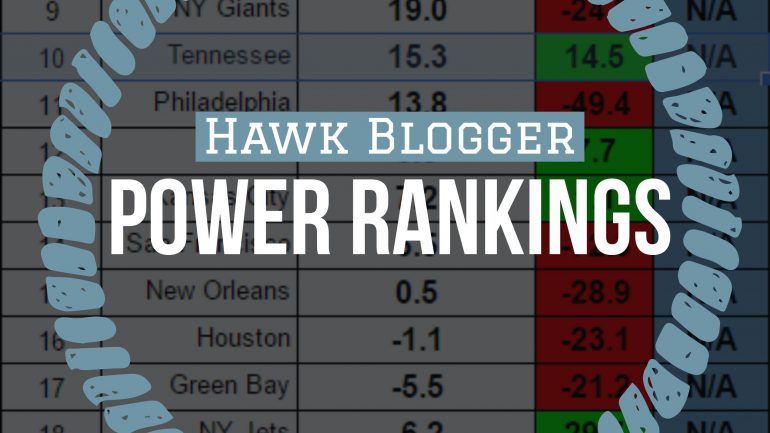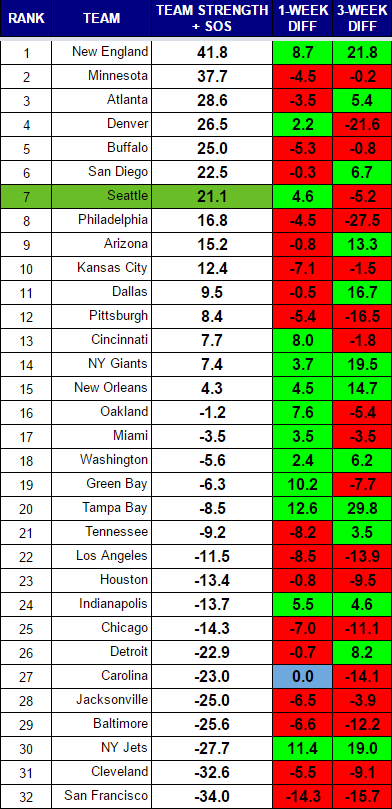POWER RANKINGS
The team that appears to be standing alone as the best in football this season, the New England Patriots, finally completed their slow rise to the top of the rankings. Admittedly, they were aided by a glitch where their strength of schedule (SOS) got a nice bump from playing a Steelers team, even though it was a shadow of the normal personnel Pittsburgh usually plays. The Patriots deserve to be the top-ranked team. They have one of the league’s most efficient and balanced offenses, piloted by arguably the best player in history, and a stingy defense that keeps opponents out of the end zone. They went 3-1 without Tom Brady. They may not lose a game with him.
Seattle continues a march through an incredibly difficult stretch. No other team this year may face a tougher six games in a row. The upcoming game at New Orleans became more difficult when the Seahawks expended so much energy against the Cardinals. The offense will need to pull their own weight against a potent Saints team that is very tough to beat at home.
- #3 Atlanta (W 26-24)
- #9 @ Arizona (T 6-6)
- #15 @ New Orleans
- #5 Buffalo
- #1 @ New England
- #8 Philadelphia
The Seahawks had the 32nd ranked SOS in last week’s rankings. The improved quality of opponents, and some improved play from past opponents like Miami, has driven up their SOS to 18th. That, more than actual game performance, explains why they team strength + SOS score improved week-over-week. They are a solid offense away from challenging New England for the title, and a good offense away from being the best team in football.
Atlanta continues to ride the best offense in football and a strong SOS to a top ranking. Strip away the SOS, and Atlanta still would rank 6th, so they are not all a product of their opponents. San Diego is a sleeper who has performed well in these rankings all year, even if some of the game results have not gone their way. They have already beaten Denver. Oakland, on the other hand, sits atop the division, but all the way down at 16th in the rankings due to a terrible defense.
Watch out for Tampa Bay, which has climbed 29.8 points over the past three weeks. They have started to find a running game, which has helped both their offense and their defense.
Rankings
Scatter chart
I like this view as it shows tiers of strength that develop over the course of the season.
RANKINGS EXPLAINED
Power rankings are always debatable. I don’t buy into the gut feel methods most places use to determine their rankings, so I developed a formula a few years back that attempts to take at least some of the subjectivity out of the discussion. My approach was simple, I measured offensive and defensive efficiency based on the Yards Per Carry (YPC) and Yards Per Attempt (YPA), as well as points scored and points allowed. The formula to calculate “Team Strength” was as follows:
(YPC (offense) + YPA (offense) + Avg Pts/Game Scored) – (YPC (defense) + YPA (defense)+ Avg Pts/Game Allowed)
The formula has proven to be a pretty accurate predictor of success (roughly 70% of the teams ranked in the Top 10 by week 3 make the playoffs), but I am always looking for ways to improve it. I read a great article on ColdHardFootballFacts.com. There was one gem in there about predicting championship teams. The article mentioned passer rating differential as the “mother of all stats.” A full 69 of 72 champions have ranked in the Top 10 in this statistic. It is a stat after my own heart, as I believe offensive and defensive efficiency is the key measurable outside of point differential. Turnovers would factor in there as well, but I am not convinced a team has as much control over that. My power rankings use YPA and YPC differentials. I went ahead and replaced the YPA with offensive and defensive passer rating, to give me this:
(YPC (offense) + Passer Rating (offense) + Avg Pts/Game Scored) – (OPP YPC (defense) + OPP Passer Rating (defense)+ OPP Avg Pts/Game)


